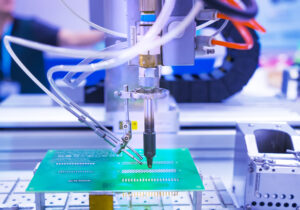As a healthcare professional, you find yourself at the dawn of a new era. Artificial intelligence has already begun transforming healthcare, and its potential is astounding. Improved diagnostics, personalized treatments, and optimized hospital workflows are just the beginning. Prepare to have your role augmented and enhanced by intelligent algorithms and empathetic robots. The future of medicine powered by artificial intelligence is an exciting frontier. Your patients will receive better care, you will have more time for critical thinking, and discoveries will happen faster than ever. So, lean into this change with an open and discerning mind. Guide it with wisdom and values. The healthcare revolution is here.
AI Is Revolutionising Healthcare
Improved Diagnostics and Personalised Treatment
AI has the potential to enhance medical imaging and diagnostics. Machine learning algorithms can detect patterns in medical scans and tests that humans may miss, enabling earlier diagnosis. AI can also help determine the best course of treatment based on a patient’s unique symptoms, medical history, and genetics. Doctors will have access to more accurate predictions of how individuals may respond to specific drugs or therapies.
Optimized Patient Engagement
AI chatbots and virtual assistants can provide patients customized information and reminders about medications, diet, exercise, and doctor visits. These tools offer convenience while freeing doctors and nurses to focus on more complex patient needs. Patients may feel more empowered and engaged in managing their health.
Streamlined Hospital Operations
Many healthcare systems are leveraging AI to improve workflow and resource management. AI can optimize staffing levels, manage inventory and supplies, schedule surgeries and procedures, and more. These efficiencies may lower costs, reduce wait times, decrease administrative burdens on staff, and allow healthcare workers to spend more time with patients.
Overall, AI will not replace physicians but rather augment human capabilities. By enhancing diagnostics, enabling personalized medicine, optimizing patient engagement, and streamlining healthcare operations, AI can help revolutionize the healthcare experience for both patients and providers. The future of AI in healthcare looks extremely promising.
AI-Powered Personalised Medicine and Treatment Plans
AI has the potential to revolutionize healthcare by enabling precision medicine tailored to individuals. What this means is that AI systems can analyze enormous amounts of health data to detect patterns and insights that humans alone may miss.
AI can detect diseases at earlier stages by spotting subtle changes or patterns in medical scans, blood tests, and other health data humans can overlook. For example, AI has shown promise in detecting signs of cancer, Alzheimer’s, and other diseases earlier and more accurately. Earlier detection of diseases leads to earlier treatment and better health outcomes.
Personalised Diagnosis and Treatment
AI will enable healthcare providers to develop personalized diagnoses and treatment plans tailored to each patient’s unique characteristics. AI systems can analyze a patient’s symptoms, medical history, genetics, lifestyle, and environment to determine the optimal treatment protocol for that individual. Treatments can then be adjusted based on a patient’s response and updated health data. This personalized approach to care will lead to better outcomes and fewer side effects.
Continuous Health Monitoring
AI also has the potential to enable continuous health monitoring using wearable devices and mobile apps. These tools can track patients’ activity levels, heart rate, sleep, and other health metrics to provide real-time insights into their well-being. AI systems can then analyze this data to detect early signs of health issues and alert physicians and patients to potentially serious conditions before they become severe. Continuous health monitoring may allow physicians to intervene even before patients notice symptoms.
AI will revolutionize healthcare through personalized medicine, earlier disease detection, continuous health monitoring, and optimized treatment plans tailored to each patient’s needs. By enabling a precision approach to care, AI can help people stay healthier and live better lives.
Early Disease Detection and Diagnosis With AI
Diagnosing diseases and conditions early and accurately is essential to effective treatment and management. AI can potentially transform early disease detection and diagnosis, enabling physicians to determine illnesses sooner and with higher precision.
Detecting Patterns and Anomalies
AI excels at detecting patterns and anomalies in large datasets. By analyzing thousands of medical scans, test results, and other health records, AI systems can learn to identify anomalies that may indicate disease. For example, AI can detect early signs of cancer by spotting minute changes in cellular structures in medical scans that humans may miss. AI also helps radiologists diagnose conditions from X-rays and CT scans with high accuracy.
Personalised Diagnosis
Every patient is unique, so AI is enabling personalized diagnosis and treatment recommendations tailored to individuals. By analyzing a patient’s genetic profile, medical history, lifestyle factors, and symptomology, AI can determine personal risk profiles for diseases and the treatments most likely to benefit that patient. Personalized diagnosis powered by AI will allow physicians to prescribe targeted treatments for patients from the moment of diagnosis.
Streamlining and Enhancing Diagnosis
AI has the potential to enhance and streamline the diagnostic process, allowing physicians to diagnose conditions more efficiently and accurately. AI-based diagnostic tools can analyze symptoms and test results to give physicians a list of the most likely diagnoses for a patient, along with the confidence level and reasoning behind each possibility. This allows physicians to consider diagnoses quickly they may have missed and determine the correct diagnosis. AI can get patients the right treatment sooner by improving diagnostic accuracy and efficiency.
AI is poised to revolutionize disease detection and diagnosis, enabling earlier, more precise, and personalized diagnoses of conditions. By enhancing physicians’ abilities to detect anomalies, decide personalized risk profiles, and streamline the diagnostic process, AI will allow patients to get the treatments they need as early as possible. The future of AI in diagnosis is an exciting prospect for improving health outcomes.
Improving Hospital Efficiency with AI Technologies
Artificial intelligence has significant potential to streamline hospital operations and reduce costs. AI systems can analyze enormous amounts of data to optimize resource allocation, predict patient flows, and improve care coordination.
AI can forecast patient volumes by analyzing historical patient data and help hospitals optimize staffing levels. To create optimized staffing plans, AI-based scheduling systems consider patient acuity, staff skills, and shift preferences. These systems can also help determine the best equipment and room usage based on predicted patient flow.
Automating Administrative Tasks
Many administrative tasks like appointment scheduling, billing, and insurance verification can be automated using AI. Virtual assistants and chatbots can handle simple patient queries and requests, freeing up staff for more complex work. AI-based data extraction tools can pull information from medical records and insurance claims to reduce time spent on manual data entry.
Coordinating Care Delivery
Care coordination is critical to high-quality care but requires managing massive amounts of data and complex logistics. AI systems can analyze patient data from multiple sources to comprehensively understand a patient’s health needs. The systems can then recommend tailored care plans, notify the appropriate staff when patients need follow-up, and schedule care activities. AI-based tracking systems give all members of a patient’s care team real-time visibility into the status and next steps of the care plan.
In summary, AI has significant potential to improve efficiency and reduce hospital costs by optimizing resource usage, automating routine tasks, and coordinating care delivery. While AI cannot replace physicians and nurses, it can enhance human capabilities by reducing time spent on mundane work and enabling staff to focus on patients. Hospitals can provide higher quality care at lower cost by adopting AI technologies.
The Future Is Here: How AI Will Transform Patient Care
AI has the potential to revolutionize healthcare in the coming decades. Physicians and healthcare organizations that harness the power of AI will be able to provide higher quality, personalized care at lower costs.
Improved Diagnostics and Prognostics
AI excels at detecting patterns and anomalies in huge datasets. By analyzing thousands of patient scans, AI systems can identify hard-to-spot signs of disease with superhuman accuracy. AI will enhance radiology, pathology, and other diagnostic specialties. AI will also help determine personalized treatment plans by analyzing how patients with similar conditions and demographics responded to various treatments.
Personalized and Preventive Medicine
AI will enable truly personalized medicine. By analyzing a patient’s genome, medical history, lifestyle, and environment, AI can determine the treatments and interventions most likely to benefit that individual. AI will also improve disease prevention by identifying high-risk people for cancer or heart disease. Preventive measures can then be recommended to help patients avoid developing these diseases.
Optimized Treatment Plans
Based on the latest medical evidence and guidelines, physicians will rely on AI to develop optimized treatment plans for each patient. AI can consider thousands of studies and patient variables to determine the therapy most likely to benefit an individual. AI will also help ensure patients continue with the full course of treatment by monitoring adherence and compliance.
Streamlined Operations
AI has the potential to make healthcare organizations run more efficiently. As such, AI can handle time-consuming administrative tasks like billing, coding, and scheduling. AI virtual assistants and chatbots can field basic patient questions and requests, freeing up staff to focus on more complex issues. AI will analyse hospital workflows to identify bottlenecks and inefficiencies to improve and streamline processes.
In the coming decades, AI and human physicians will form partnerships that leverage the best of both—doctors’ insight, empathy, and judgment combined with AI’s data-crunching power. This fusion will enable healthcare quality and access that has never been possible. The future of AI in healthcare is incredibly bright.
The Conclusion?
Looking to the future, AI promises to revolutionize healthcare in exciting new ways. From early detection to personalized treatments, it is set to transform patient outcomes. Taking on time-consuming administrative tasks will free up staff to focus on patient care. The possibilities for enhanced efficiency and effectiveness are immense. While regulation and data privacy challenges remain, AI can increasingly impact your healthcare. By embracing its potential, patients and practitioners can realize the dream of more accurate diagnoses, targeted therapies, and an optimized healthcare system. Approach this AI-driven future with cautious optimism, and you may find yourself at the forefront of a healthcare revolution.
More Stories
BNP Paribas Banks on IBM Cloud to Fortify Financial Resilience
BNP Paribas, one of the world’s largest banks, has recently taken a significant step in its digital transformation journey.
Spark New Zealand Seeks Co-Investor for Data Center Portfolio in NZ$1.2 Billion Stake Sale
Spark New Zealand is taking strategic action to meet rising demand for data center services through a major capital-raising initiative.
Cloud WAN: Premium Tier & Verified Peering Provider for reliable global connectivity
By integrating Premium Tier networking and the Verified Peering Provider program, Cloud WAN now provides you with unparalleled reliability, security, and performance.
Tariff Turmoil Fuels Alibaba.com’s Ascent in U.S. Shopping App Rankings
As global trade continues to evolve, a shift in U.S. e-commerce has caught attention. With rising tariffs on Chinese imports,...
Taobao’s Turbo Turnaround: Alibaba’s Swift Strike in China’s Delivery Duel
E-commerce in China is undergoing a seismic shift. Alibaba's "Taobao Instant Commerce" service is accelerating its launch. This marks a...
From Wireframe to Wonder: NVIDIA’s AI Blueprint Transforms 3D Sketches into Stunning Images
AI-driven image creation is experiencing a groundbreaking shift. This fusion combines 3D modeling with generative AI. NVIDIA's "AI Blueprint for...


